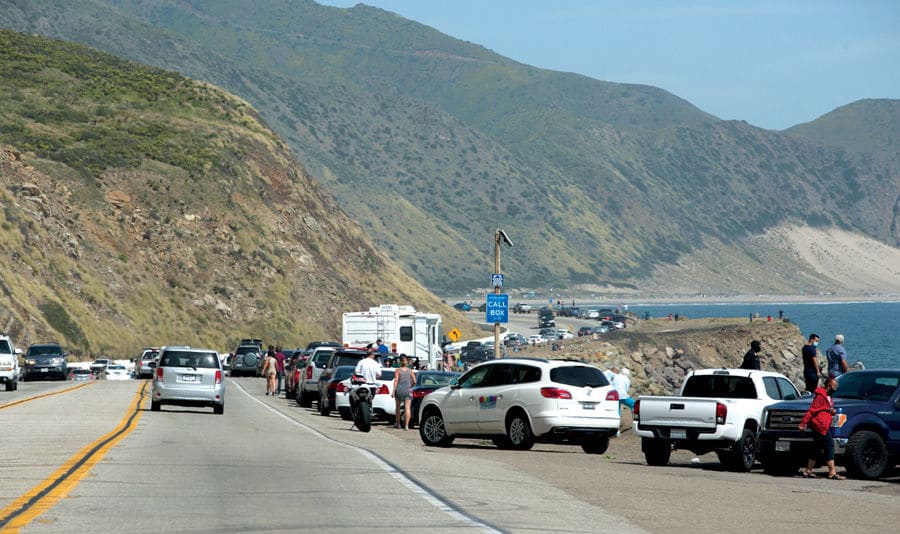Should the city add parking lots to handle its abundance of visitors, who always seem to block your driveway or run out across PCH? If so, what will those parking lots look like?
Malibu City Council Monday night, Nov. 23, chose to hold off on those decisions, voting unanimously, 5-0, to table a proposed ordinance that would address the issue in order to give city staff a chance to do more public outreach, study its effects on traffic and edit the ordinance’s language.
“Whenever I look at these things that could have … a lot of unintended consequences, it’s probably better to be more deliberate about it and storyboard all the things that could go sideways,” Council Member Rick Mullen said.
The City of Malibu purchased three plots of land from the Malibu Bay Company in 2018, using funds it already had, funds it borrowed and funds from LA County’s Measure M, which were granted only on the condition that the city use the land it bought for transportation-related purposes. The city promised to provide parking on each of the three lots in order to access the money it needed to purchase the land; without those hypothetical parking lots, the city does not get that money and hence cannot afford to keep the land.
Enter Monday night’s ordinance. Currently, surface parking lots can only be constructed in association with a commercial structure such as a shopping center or an office, according to the Malibu Municipal Code. The ordinance would change that, creating a new land use type—known as “Stand-Alone Surface Parking Lots”—that would be allowed in certain zones of the city, most notably in the Civic Center area. The ordinance also outlined that the parking lots must have 30 percent permeable surface area to reduce run-off, 50 percent shade to reduce the heat island created and to provide habitats for wildlife and adhere to other such regulations.
The ordinance originated from a 2017 request by Pepperdine University to be allowed to use its Wave property as parking, then made its way through multiple bodies, such as the city’s Zoning Ordinance Revision and Code Enforcement Subcommittee (ZORACES) and the planning commission, before landing at city council—who punted it to next year.
Public Safety Commissioner Doug Stewart was the only public commenter to argue in favor of passing the ordinance, saying that while residents don’t necessarily need more parking, visitors to the city certainly do.
“We can’t keep [Malibu’s 12 to 15 million annual visitors] away, so we need to be sure they don’t harm residents’ quality of life” by parking on sidewalks and blocking traffic, Stewart said. Stewart pointed out the “traffic nightmare” around the Malibu Pier and Nobu restaurant and mentioned that the city’s parking problems will get worse as building continues in the Civic Center, notably at the La Paz site, a permitted development along Civic Center Way near Legacy Park. According to Stewart, the ordinance would satisfy neighbors’ complaints and increase pedestrian safety.
But many more public commenters raised concerns about the viability of the ordinance and said it needed fine tuning, urging the council to hold onto it until the newest-elected members could have a say.
Bruce Silverstein, one of those council members-elect who will be sworn in next month, described the ordinance as “ill-conceived” and “deeply offen[sive]” to the Malibu mission statement, book-ending his statement by playing a recording of Joni Mitchell’s “Big Yellow Taxi.” “They paved paradise, put up a parking lot,” Mitchell sang out across Zoom.
Silverstein told the council to reject the ordinance and consider the dozens of written comments he and other community members had sent in. According to Malibu City Clerk Heather Glaser, 62 total comments were sent in; the city did not provide a tally of how many were for or against the ordinance.
Other commenters said similar things, urging the council to better define what the parking lots would be used for—Planning Commission Chair John Mazza spoke of the concern that the potential lots might be used for car dealerships and overnight parking, not transient use—and think about whether or not subterranean parking could be considered, to which others responded that the water table would not allow it.
“This smells like Beverly Hills to me,” one resident, Scott Dittrich, said. He pointed out that while the residents do not need lots, restaurant employees do, but that the ordinance in its current form does not explicitly iron out those two distinctions. He described the ordinance as having “serious defects” and desired more study on the issue, specifically pointing to the issue of flammability in landscaping.
Still others worried that more parking lots would just encourage more visitors to come to Malibu, instead of assuage the burdens created by the ones the city already has, and that more parking lots would remove Malibu’s open spaces that residents have been fighting to protect.
The city is still collecting comments on the ordinance; more information on the proposed ordinance is available at bit.ly/ParkingLotAgenda.

